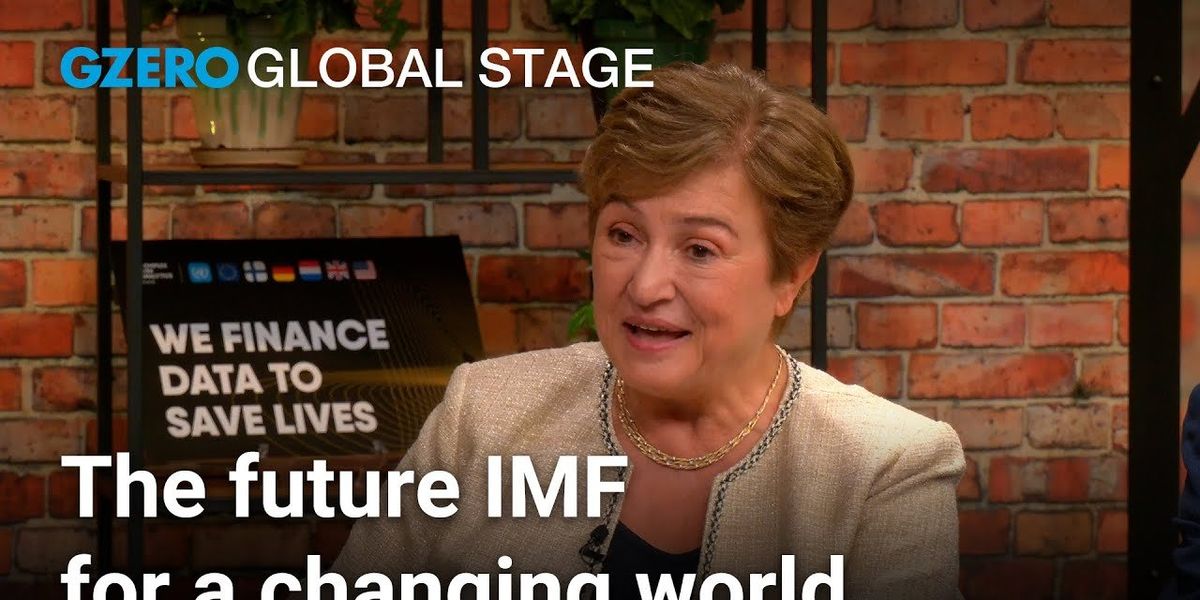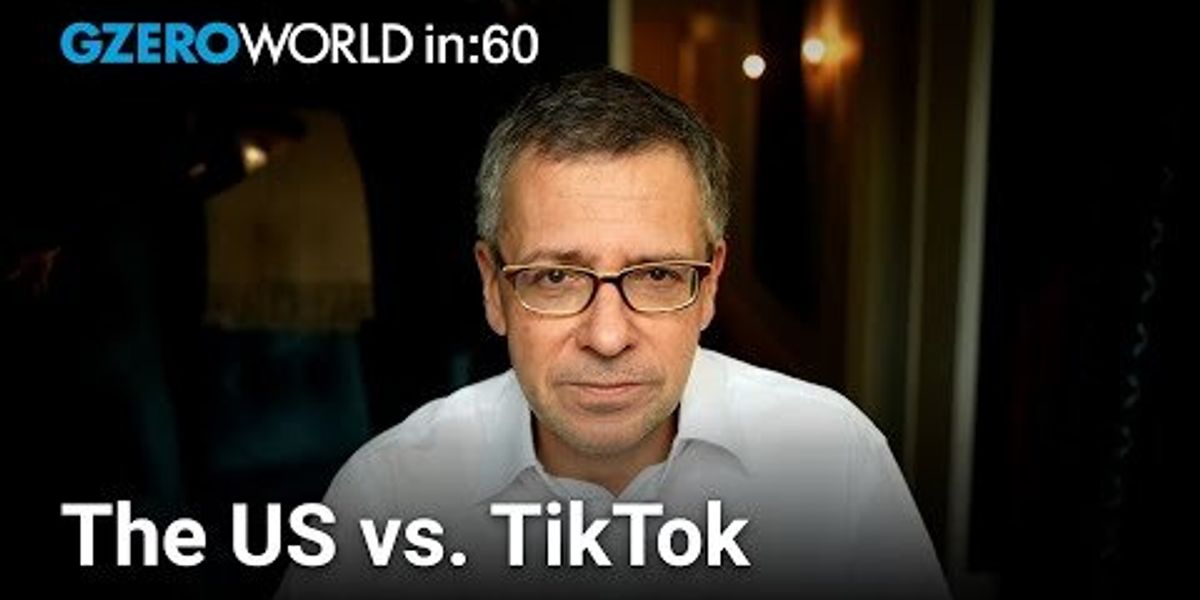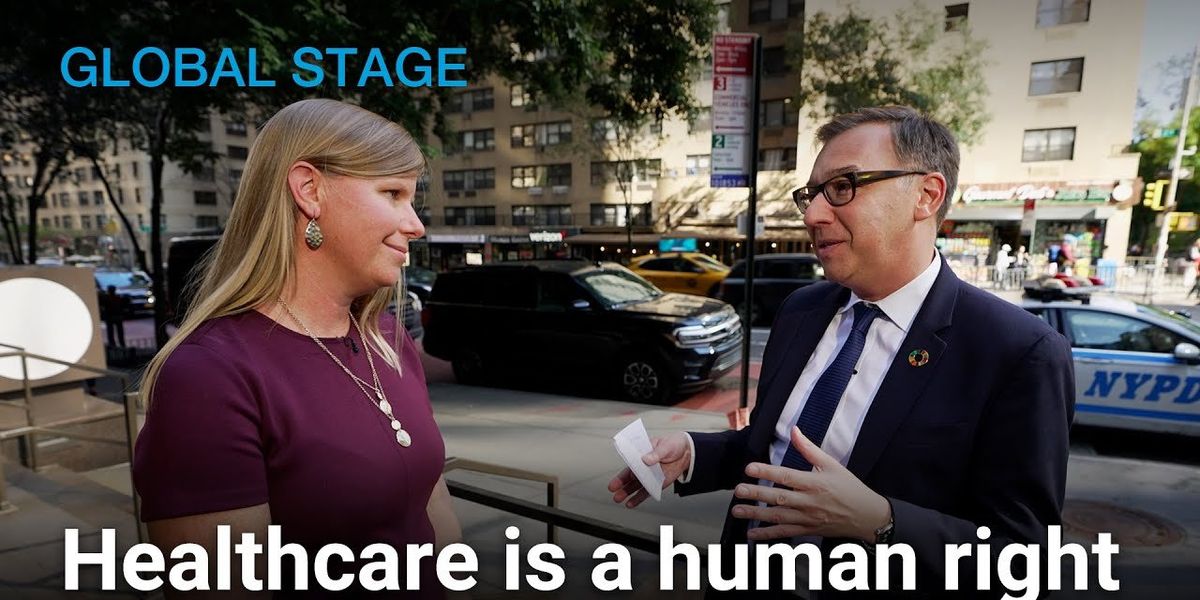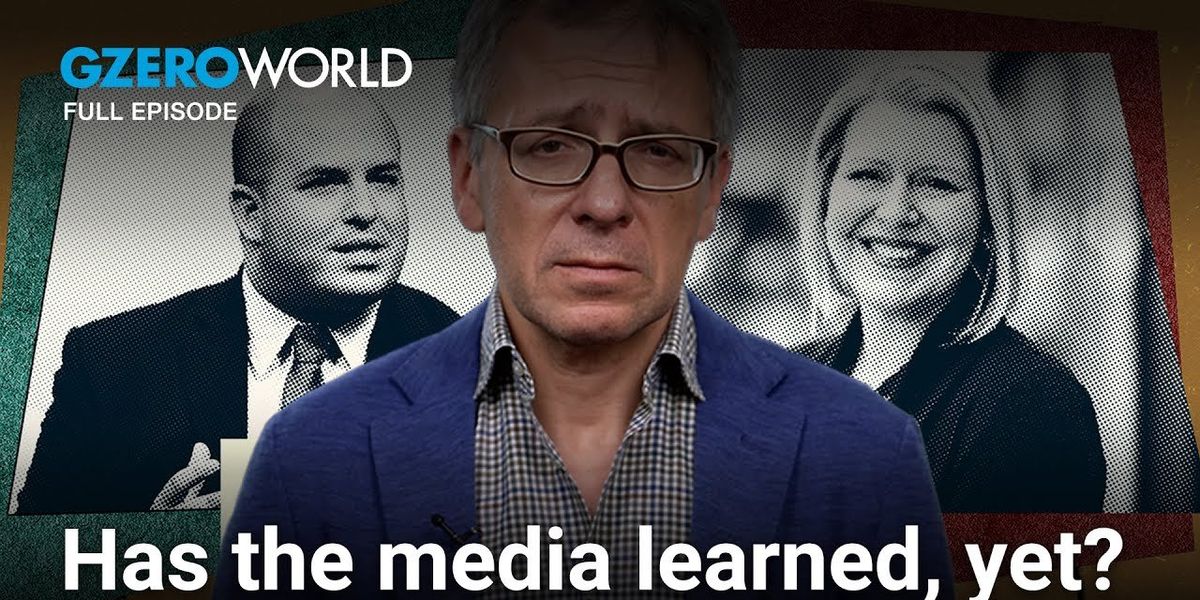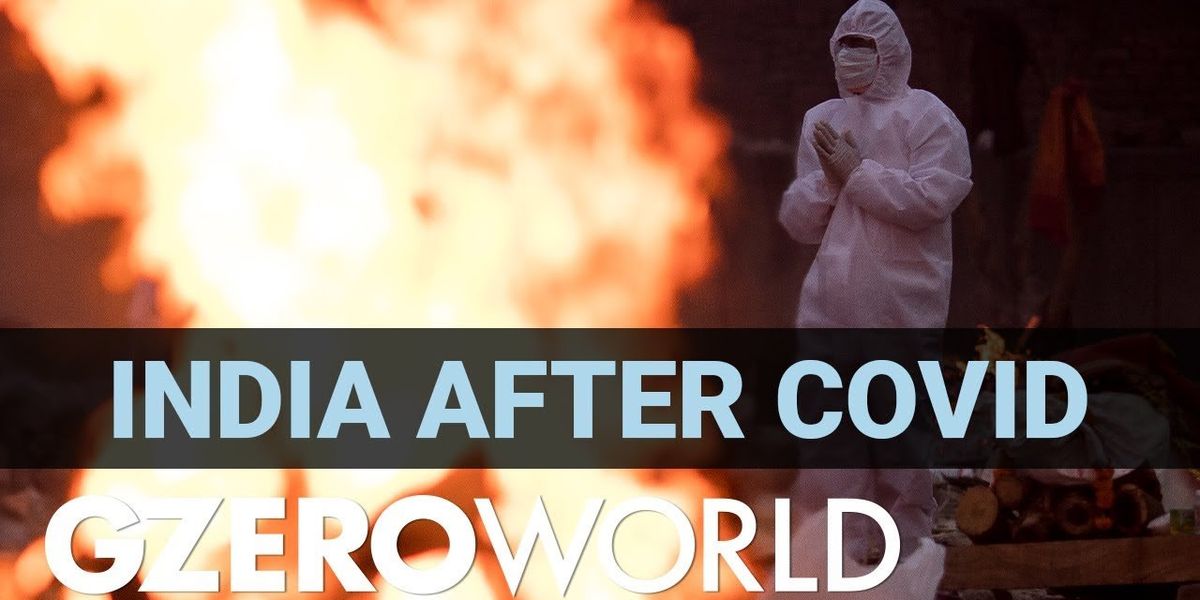Trending Now
We have updated our Privacy Policy and Terms of Use for Eurasia Group and its affiliates, including GZERO Media, to clarify the types of data we collect, how we collect it, how we use data and with whom we share data. By using our website you consent to our Terms and Conditions and Privacy Policy, including the transfer of your personal data to the United States from your country of residence, and our use of cookies described in our Cookie Policy.
{{ subpage.title }}
IMF's Kristalina Georgieva: We help countries build resilience to handle shocks
In a GZERO Global Stage discussion at the 79th UN General Assembly, IMF Managing Director Kristalina Georgieva expressed pride in the institution’s proactive response during a period marked by global crises. Georgieva emphasized that the IMF’s role extends beyond financial aid by helping countries build strong policies and institutions, ensuring resilience in the face of shocks.
“We are growing this year 3.2%, next year 3.2%. And it is because of this foundation that has been built over the decades of strong policies and good institutions. Where you have it, shocks do not crush you.”
However, Georgieva emphasizes that as the world evolves, so too must the IMF. She highlights how the IMF recently added a third chair for Sub-Saharan Africa to enhance representation and legitimacy in its governance structure.“
If you want to be respected and legitimate, we have to show that we are not stuck in our glorious past, that we are forward leaning, so countries can think of us as their family, that it is inclusive and embracing all of our members.” Click here to watch the full conversation.
The US vs TikTok (and China)
Ian Bremmer shares his insights on global politics this week on World In :60.
Four years since the US declared COVID a national emergency, how did it permanently reshape the world?
Well, a couple of things. First, it meant that US-China relations got worse, not better. The World Health Organization, the one global organization meant to deal with pandemics, got delegitimized. This was not a crisis that led to greater cooperation. It led to greater mistrust and greater polarization, in part because it wasn't a big enough crisis. Thankfully, we had vaccines really fast, and it also turned out that COVID really affected mostly the super elderly and those with serious preexisting conditions. All of that allowed the geopolitical rifts that already exist to get worse. One good thing, aside from the fact that technology really works, is that the Europeans got stronger on the back of this crisis. They now have more coordinated capabilities to respond to health crises than they did before the pandemic hit. And that has been the EU response to a lot of crises recently, Brexit, the Russian invasion of Ukraine, you name it.
As the US House goes after TikTok, does it speak to a broader US-China battle?
Well, it speaks to significant mistrust between the two countries. Espionage by the Chinese against the United States, by the way, that goes both ways of course. The Americans just aren't concerned about US espionage into China. Also, the fact that the Chinese don't allow Western social media companies to have access to the Chinese population and data. So no one should be all that surprised that the Americans are interested in forcing ByteDance to spin off TikTok. Having said that, the Chinese are pretty unhappy about it and have said that they're not going to spin it off. We'll see if their bark is equivalent to their bite. Assuming this passes in short order in House and Senate. Biden has said that he would sign it and then there's the broader question of does it undermine what has been a pretty strong effort by both the Americans and Chinese to communicate more thoroughly in the relationship and stabilize the baseline so that we don't have conflict that scales out of control and that has worked reasonably well since the APEC summit back in San Francisco in November? But that doesn't mean it will hold if the Americans start throwing more punches. On balance, I think forcing China to spin off TikTok is a reasonable thing for the Americans to do, but it will be one more straw on the camel's back. Let's see what happens in terms of Chinese response.
Finally, Princess Kate and the photoshop-fail heard around the world!
Big deal? Well, look, I mean, I am someone, as you know, that tries to keep a much lower profile than Princess Kate. So I don't like to necessarily share all the things that I'm doing around the world. But, I mean, you know, given everyone focusing on Kate's photo, I will share that in the last few days, I was there with Sweden, of course, and the prime minister, who I know well when they formally joined NATO. There was, of course, also the State of the Union, which, you know, I was doing live commentary on and right there from the gallery. But you probably are surprised that I was also right behind the scenes at the Oscars. I don't usually show for that. And it's not because I don't wear a tie, but they gave me dispensation. And also let me bring Moose, which is very important. Don't fall asleep on Princess Kate, right? I mean, you know, she has a hard enough time and she's got to distract away from King Charles. We don't know what's going on with him either. We don't really care. At least I don't.
- Sen. Mitt Romney on TikTok: Shut it down ›
- The Graphic Truth: The world's other royals ›
- Monarchies that matter ›
- China's COVID lockdowns made its people depressed and hurt its economy ›
- Should Putin get a Nobel in Medicine for ending talk of COVID? ›
- TikTok "boom"! Could the US ban the app? ›
- Graphic Truth: The world is crazy for TikTok ›
- TikTok is the ultimate propaganda tool, says tech expert Scott Galloway ›
“Health is a human right”: How the world can make up progress lost to COVID
The state of public health in the developing world bears some deep scars from the COVID-19 pandemic. Over the past three years, immunization rates have dropped to levels not seen in three decades. 2 billion people are facing "catastrophic or impoverishing" health spending worldwide according to the World Health Organization. And governments in the Global South are taking on more and more debt at the expense of investment in health and social services.
Kate Dodson, the Vice President of Global Health Strategy at the UN Foundation, is on the frontlines of the fight to give the most vulnerable people in the world access to proper healthcare. She works to connect experts and innovators with the UN, and find resources to support their work.
She’s calling on governments to invest in basic elements of public health, including primary care access, and properly remunerating healthcare workers — the majority of whom are women, worldwide. And more fundamentally, she wants leaders to treat health as a human right that all deserve to enjoy.
More from Global Stage: https://www.gzeromedia.com/global-stage/
- Can surveillance prevent the next pandemic? ›
- Highlights from our live discussion on post-pandemic health security ›
- Eris on the rise ahead of predicted fall COVID wave ›
- China's COVID lockdowns made its people depressed and hurt its economy ›
- Ian Explains: Is the world better today thanks to human progress? - GZERO Media ›
- How can the world build back better public health after COVID? - GZERO Media ›
- Is life better than ever for the human race? - GZERO Media ›
China's COVID lockdowns made its people depressed and hurt its economy
China’s economy keeps slowing down, and that could be a problem for the rest of the world.
On GZERO World, Shaun Rein, founder and managing director of the China Market Research Group, sits down with Ian Bremmer to explain why he’s become bearish on China’s economic outlook.
2023 was supposed to be the year China’s economy came roaring back after almost three years of brutal zero-COVID lockdowns that ground domestic spending and production to a halt. But Rein points to a few reasons why China’s rebound hasn’t exploded the way some economists predicted.
“I think people underestimated how much the lingering effects, not just economically but physiologically, that [zero-COVID] would have on China,” Rein says, pointing out that 50% of people in Shanghai suffer from anxiety and depression, according to the government.
Rein argues that because income levels in 2022 stayed so low, with millions of Chinese locked down and furloughed from their jobs, the revenge spending expected after zero-COVID ended never materialized. He also says that an increasingly hostile geopolitical environment under the Biden administration has made COVID recovery even more challenging.
Watch the GZERO World episode: China’s economy in trouble
And watch GZERO World with Ian Bremmer every week on gzeromedia.com/gzeroworld and on US public television. Check local listings.
- China flirts with deflation. Why is that a bad thing? ›
- The Graphic Truth: China's old vs. new zero-COVID ›
- China’s zero-Covid woes deepen ›
- Birdsong and stolen cherries: Lockdown life in Shanghai ›
- “Health is a human right”: How the world can make up progress lost to COVID - GZERO Media ›
- The US vs TikTok (and China) - GZERO Media ›
Politics, trust & the media in the age of misinformation
Ahead of the 2024 US presidential election, GZERO World takes a hard look at the media’s impact on politics and democracy itself.
In 1964, philosopher Marshall McLuhan coined the phrase, “the media is the message.” He meant that the way content is delivered can be more powerful than the content itself.
A lot’s changed since 1964, but the problem has only gotten worse. The ‘80s and ‘90s saw the rise of a 24/7 cable news cycle and hyper-partisan radio talk shows. The 21st century has thus far given us podcasts, political influencers, and the endless doom scroll of social media. And now, we’re entering the age of generative AI.
All of this has created the perfect ecosystem for information––and disinformation––overload. But there might be a bright spot at the end of the tunnel. In the world where it’s getting harder and harder to tell fact from fiction, news organizations, credible journalists, and fact-checkers will be more important than ever.
How has media changed our idea of truth and reality? And how can we better prepare ourselves for the onslaught of misinformation and disinformation that is almost certain to spread online as the 2024 US presidential election gets closer? Can trust in American’s so-called “Fourth Estate” be restored?
Ian Bremmer sits down with journalist and former CNN host Brian Stelter and Nicole Hemmer, a Vanderbilt University professor specializing in political history and partisan media.
Watch GZERO World with Ian Bremmer at gzeromedia.com/gzeroworld or on US public television. Check local listings.
- Coronavirus is "the Super Bowl of disinformation" ›
- Artificial intelligence and the importance of civics ›
- Should the US government be involved with content moderation? ›
- Be very scared of AI + social media in politics ›
- Who runs the world? ›
- Can we trust AI to tell the truth? - GZERO Media ›
- Will consumers ever trust AI? Regulations and guardrails are key - GZERO Media ›
- CISA chief warns of rise of disinformation, election meddling after Nov 5 - GZERO Media ›
India after COVID
Few nations were as ravaged by COVID as India, especially when the Delta strain tore through the country in the spring of 2021. Delhi-based journalist Barkha Dutt experienced its toll as both a journalist and a daughter. Back when she first appeared on GZERO World in May 2021, she had just lost her father to COVID. She was simultaneously grieving and covering COVID's impact across India.
Two years later, Ian welcomes Dutt back on the show to discuss a wide range of US-India issues, but also to check in with her on how the trauma of COVID has changed her life, as well as the direction it has taken her country, two years later.
"It's been, personally, a very, very painful time, and professionally, ironically, some of my best work, and to reconcile that is quite a difficult thing to do, emotionally."
Tune in to “GZERO World with Ian Bremmer” on US public television to watch the full interview. Check local listings.
Newly elected National Rally leader Jordan Bardella with the outgoing Marine Le Pen during the party congress in Paris.
Hard Numbers: French far-right handover, Big Oil makes big bucks, China vs. COVID, Peruvians want prez out
50: For the first time in 50 years, the main French far-right party will not be captained by a Le Pen. Marine Le Pen, daughter of founder Jean-Marie Le Pen, has now handed over the reins of the National Rally to Jordan Bardella, 27, in a clear play for young voters.
200.24 billion: Publicly listed US oil companies reaped $200.24 billion in profits during the second and third quarters of the year thanks to higher prices driven by Russia's invasion of Ukraine. President Joe Biden wants to hit Big Oil with a windfall tax unless they pump more crude to bring down gasoline prices.
4,420: That's how many new COVID infections China reported on Saturday, the most in six months. No wonder the government once again confirmed that it has no plans to relax its zero-COVID policy anytime soon — whatever the economic damage.
6: Thousands of Peruvians took to the streets of Lima on Saturday to demand the resignation of embattled President Pedro Castillo. The left-wing Castillo has already survived impeachment twice and is the current target of six separate corruption probes.Labourers rest as they offload bags of grains as part of relief food that was sent from Ukraine at the World Food Program (WFP) warehouse in Adama town, Ethiopia.
Hard Numbers: Sub-Saharan Africa’s food crisis, Belograd attack, Uganda’s Ebola lockdown, COVID vaccine makers take a hit
123 million: At least 123 million people across Sub-Saharan Africa are food insecure, according to a new report by the International Monetary Fund. The region was on the brink of economic recovery, but that’s changed since the war in Ukraine upended the global economy. IMF senior economist Andrew Tiffin recently spoke to GZERO about Africa’s hunger and energy crises. Watch the interview here.
11: Two men opened fire on Russian soldiers at a training camp in the Belograd region of Russia on Saturday, killing 11 and injuring more than a dozen before being shot and killed. Russia’s Defense Ministry said that the gunmen were from a former Soviet republic, but gave no further details. The shooting, which took place near the Ukrainian border, comes amid mounting opposition to Vladimir Putin’s unpopular "partial mobilization" campaign.
2: Two Ugandan districts outside the capital Kampala have gone into lockdown as the government tries to contain a growing Ebola outbreak. The vaccine developed to inoculate against the Zaire strain, which killed 11,000 people across West Africa from 2013-2016, is not effective against this newer strain, which originated in Sudan.
37: The average price for a COVID vaccine will rise to $37 in 2023, double the average price in 2021, as demand for booster shots slumps. As sales drop off, Pfizer, BioNTech and Moderna – vaccine makers that first produced the effective mRna shots – are anticipating big losses.
This comes to you from the Signal newsletter team of GZERO Media. Sign up today.
